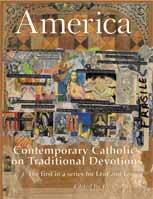Jan. 12, 1995 is etched permanently in my memory. My father, suffering a fatal bout of bronchial pneumonia, died peacefully at approximately 8 o’clock in the evening, in the intensive-care unit of Kettering Memorial Hospital in Dayton, Ohio. I will forever remember the details leading up to and following that sacred moment, when I held his hand in mine and witnessed firsthand his spirit escape his body, leaving behind the cold shell of a corpse.
Every Jan. 12, I commemorate the date by calling my sisters and sharing favorite memories of my dad, by pulling out some old photos, by stealing a few still minutes in the day’s disorder and allowing myself some tears. I take time to remember because I never want to forget.
The Stations of the Cross serve the same purpose: to remember Jesus.
The devotion began as a way for Jesus’ disciples to recall and honor their friend after his death. Believers walked the Way of Sorrows in Jerusalem, the same steps that their Lord and Savior had walked to his crucifixion. They returned to the important places associated with Jesus’ life, death and resurrection so as better to understand and appreciate the greatest of Christian stories. At the beginning of the fourth century, shrines were erected at the most significant spots along the Way of Sorrows, and eventually imitations or representations of them sprang up all over Europe, providing a replication of the experience to believers who could not make the arduous trip.
Today stations hang on the walls of virtually every church in the world as a way of reminding us of that central event in our faith. They are snapshots of the man who died to save us from ourselves, a kind of storybook on the wall describing the Christian journey to redemption.
For me, the stations are at the heart of Lent. Each year, at the most depressing time of year—when the days are shortest, coldest and darkest—I amble into church to celebrate the story that places my worries and tribulations into proper context.
I smell the incense and remember how Jenny Sand would faint every Friday afternoon in between sung stanzas of “Were You There?” and “Ashes” as our sixth-grade class gathered for the Stations. I listen to the narrator describe how Jesus fell three times, how Veronica wiped his face, how Simon helped carry his cross and how his mother Mary cried upon seeing him. I think about all the suffering in the world and wonder what I can do about it.
Every year the stations are the same—Jesus always meets the women of Jerusalem; he is always stripped of his garments; he is always nailed to the cross. I’m comforted by a little repetition and sameness in a rapidly changing world; I relish the sense of continuity amid confusion that the stations provide.
But each year the stations also mean something different. I’m at a different place. As a young mother of a boy, I better understand the pangs of sorrow Mary must have felt seeing her son ridiculed, scourged and ultimately crucified. Having grieved over the passing of loved ones, I know the uncomfortable silence that follows death.
Depending on the year’s events, I meditate on each station and pray for a specific intention. And then, when I get to the end of the story—to the Resurrection—I experience a kind of hope, a hope that is possible because I have not forgotten. I have remembered.








